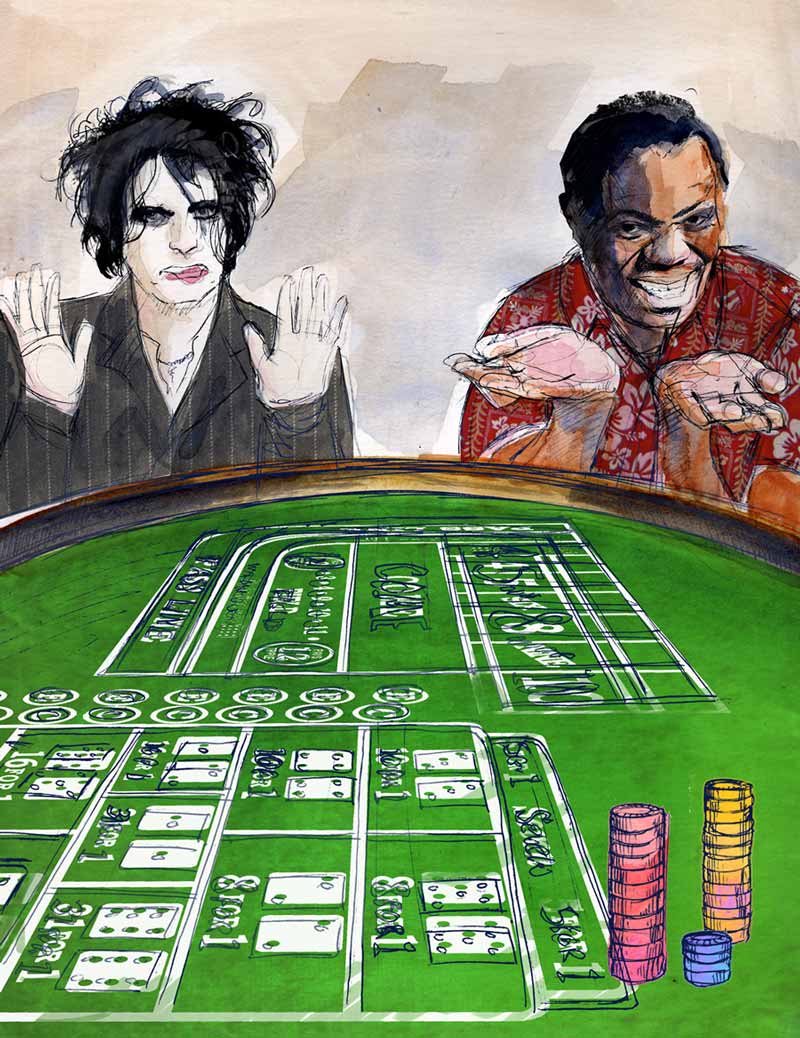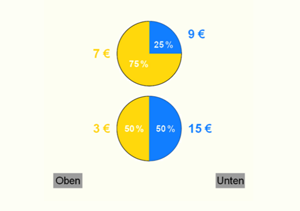
The music of Robert Smith (lead singer of The Cure) and Louis Armstrong affect our lottery choices, with “happy” music prompting us to take riskier bets, according to research. Creative Commons, Attribution-NonCommercial-NoDerivs 3.0 Unported
HAPPY music such as Louis Armstrong’s “St Louis Blues” can lead you to making riskier lottery bets, according to new research.
A study led by Freie Universität Berlin1 found sad music ranging from Samuel Barber’s “Adagio for Strings” to The Cure’s “Trust” and “Apart” prompted more conservative gambling choices.
Scientists tested how the emotions of volunteers were “manipulated” by music, random tones or silence when choosing between pairs of lottery bets.
Which would you gamble on, a 50 per cent probability of winning 3euro, or 15euro with a probability of winning of 50 per cent? Similarly, would you bet on a 75 probability of winning 7euro, or a 25 per cent chance of gaining 9euro.
The researchers found that after listening to a mix of music deemed “happy”, subjects made riskier bets.
Forty-one participants (28 women, 13 men, average age of 27) listened to happy or sad music, a sequence of random tones and to no music at all, each one week apart. Researchers then compared how often they chose the riskier lottery options.
The subjects sat in front of computer with headphones doing the tasks, listening to about six minutes of clips of the pieces, all without vocals, made up of either 12, 30-second happy music clips or six, 60-second sad music clips. All the music was selected through experiments in other research published in 2013. They included classic, Irish jigs, jazz, reggae, South American and Balkan music, while the sad pieces all featured minor keys, slow tempos or low pitch variation.
HAPPY (Composer (Artist) / Title)
- Joel Francisco Perri – El Canto de Mi Antara
- Craobh Rua – The Lucky Penny
- Scotch Mist – Shetland Tune
- Alfredo de Angelis – Pregonera
- Romanian Folk Dance – Batuta de la Adancata
- Louis Armstrong – St Louis Blues
- Niccoló Paganini – Violin Concerto No. 1, 3rd movement
- Jonathan Richman – Egyptian Reggae
- Johann Joachim Quantz – Concerto for Flute and Orchestra, No. 256 in A Major – allegro Di Molto
- Franz Anton Hoffmeister – Concerto for viola and orchestra in D major: I. Allegro
- Georg Friedrich Händel – Arrival of the Queen of Sheba (Sinfonia from the opera Solomon)
- Michael Praetorius – Dances from Terpsichore: 6. Volte
SAD
- Samuel Barber – Adagio for Strings
- Goran Bregovic and Athens Symphony Orchestra – Elo Hi (Canto Nero)
- Himlar Örn Hilmarsson – The Black Dog and the Scottish Play
- Frédéric Chopin [(1837)—Alfred Eschwé and Razumovsky Sinfonia] – Marche funebre from Piano Sonata No. 2 in B Flat Minor, Op. 35
- The Cure – Trust
- The Cure – Apart
Researchers wanted to test the effects of “incidental emotions” on decision making, such as from listening to music, as opposed to more dramatic stimuli, such as “losing a loved one”.
Participants chose their emotional state – for example, “I am happy” or “I am sad” – as well as other questions throughout the process. After the music, they had to choose which of two lotteries they would opt for, ultimately making 100 choices in each of the four sessions.

Sample lottery choice from “Music-evoked incidental happiness modulates probability weighting during risky lottery choices”, published in Frontiers in Psychology.
The potential payoffs and the probabilities of winning were represented as pie charts, and options with a bigger risk offered a greater payoff.
Only at the end of the final session did participants learn how much they won and received it in cash, plus a total fee for participating of 24euro.
In total, the research is based on 16,400 choices (41 participants x 4 music or non-music sessions x 100 lottery choices).
Amongst the findings:
- People chose riskier lotteries most often after happy music, followed by no music, random tones and sad music.
- Participants were “significantly” more happy after the happy music, but this effect evaporated within 10 minutes.
- Random tones had similar effects to sad music. But researchers pointed out that people were not sadder from listening to “sad” music, simply less happy.
- There were no changes in people’s “calmness”, another measure during the sessions.
- There was no difference in the choices of men and women.
The happy music made people more optimistic in judging probabilities. So, for example, a 25 per cent chance of winning might look more favourable to someone after listening to happy music, compared to someone listening to sad music or tones that made them less happy. They would be more or less averse to risk depending on their emotional state.
The study stated: “Even more intense changes in emotion might result in avoiding making a decision altogether and postponing it to less turbulent times. In contrast, people may be relatively unaware of the influence of subtle emotional changes on their decisions and hence may be unable to regulate it.”
The paper suggested further research could be done on eye movement and mouse tracking to see the psychological processes involved and also data from the brain.
Stefan Schulreich,2 a PhD candidate in “languages of emotion” group at Freie Universität Berlin (Arbeitsbereich Emotionspsychologie und affektive Neurowissenschaft), was the lead author of the paper.
He said: “Normally people are risk averse – they tend to avoid risk and go for sure options. We found that when people are in a more happy state, they tend to be less risk averse than people who are in a less happy state.
“Music was our means to manipulate emotions. I would argue this is not music specific.”
Mr Schulreich added that people should realise that “the emotional state you are in can alter your decisions when confronted with risky options, at least subtly”.
Dr N Will Shead, assistant professor of psychology at Mount Saint Vincent University in Halifax, Nova Scotia,3 said the German-led research added to existing work on the motivations for people gambling.
He explained that much of his research is also looking at aspects of “non-problem gambling”, and what people expect to get out of gambling, emotionally. Some individuals gamble with the expectation that it will relieve some kind of negative mood, while others expect gambling will augment a positive mood. A third group doesn’t expect either to happen, explained Dr Shead.
He said the clinical definition of gambling has now changed, from “pathological gambling” to “gambling disorder”, with the criteria for diagnosing the condition switching from gambling to escape, to gambling to relieve distress.4
Dr Shead said: “It seems to be pretty good research. It adds a little bit to the research because it suggests another thing that could be potentially explored in a clinical population, which is always good – it’s always good to have this kind of research to work off of.
“We do know that people who have this expectation that gambling will relieve some kind of negative mood, such as feeling depressed or anxious, that those individuals are more susceptible to gambling problems. One of the hallmarks of a gambling disorder is to gamble in order to relieve this negative mood. In the study I did, I would have predicted that people who gamble to relieve this negative mood would be more likely to make risky choices. But when I compared the different groups on how they made choices on a risk taking task, the people who tended to have this expectation that gambling would augment a positive mood, they tended to make the riskiest choices.”
Dr Shead said that matches with the Freie Universität Berlin research, though they approached it from different directions.
He added: “It’s kind of interesting to see it kind of confirms that relationship kind of exists between wanting to experience some kind state of happiness and making risky choices. There seems to be something inherent about making riskier choices and having a positive mood.
“The problem that arises with certain types of gambling and gambling patterns is when people spend too much time gambling, when they’re spending money that’s beyond their means and they lose control over that gambling. That hasn’t been shown in this research. It’s not suggesting that people are losing control of their gambling when this music evokes happiness in them. It just shows that they’re making riskier choices, which I would argue isn’t necessarily a bad thing.
“When it comes to gambling, it’s not necessarily maladaptive to be making riskier choices. From an economical standpoint, [the choices] could be perfectly irrational.”
Dr Shead’s current research is considering variables that can be manipulated to dissuade people from gambling too much.
“Music-evoked incidental happiness modulates probability weighting during risky lottery choices” was published in Frontiers in Psychology.5

